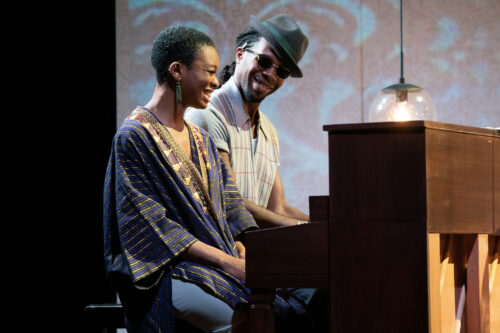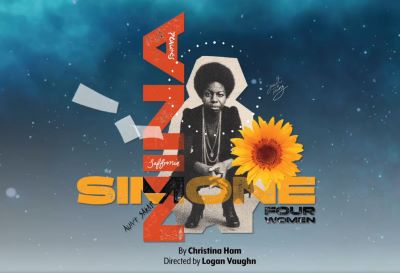FOUR-GET ABOUT IT
While her career may be skyrocketing as a TV writer, Christina Ham has not mastered the art of playwriting. I felt terrible thinking that after seeing the opening of her world premiere Nina Simone: Four Women at South Coast Rep last weekend (right when the Orange County Museum of Art, OCMA, had its 24-hour grand opening), so I researched and found little about her plays in production, so what — according to her bio — makes her an “accomplished” playwright? From what I can tell, she has had work developed at some of the most prestigious companies in the U.S. and some produced. So, with nothing to back up her stage writing (except a completely different version of the play at hand produced in Chicago), SCR decided to waste an amazing amount of money and talent on a washout script. This smacks of SO many plays I’ve seen and covered from here to New York that are by promising (fill-in-the-BIPOC-blank) writers with a desire to tell stories from their perspective, regardless of whether the script at hand is worthy of being produced. Instead of storytelling, we get diatribes. With Nina Simone: Four Women, you’ll leave wishing for less ranting and more singing.
Chibuba Osuala and Arie Bianca Thompson
Anyone who knows of Nina Simone would kill for a great play about the composer/activist/entertainer who radicalized jazz and pop with her pointed songs and idiosyncratic style. Behind the scenes, the upper-middle-class Simone struggled with bipolar disease and was frequently known to throw tantrums. But her multifaceted personality, incredible speaking skills, and amazing interpretive musicianship rightfully won over legions of fans. Fed up with American racism (she supported black nationalism and advocated violent revolution), she eventually moved from the U.S. in 1973, nine years after Ms. Ham’s disjointed play occurs.
Jennifer Leigh Warren, Chibuba Osuala and Meredith Noël
Before she scribed “Mississippi Goddam” — an answer to the June 12, 1963, murder of Medgar Evers and the September 15, 1963, bombing of the 16th Street Baptist Church in Birmingham that killed four young black girls — Simone was basically a club musician and recording artist. Her claim to fame came in the mixing of jazz, blues, pop and classical music. It wasn’t until later in her career that her songs turned towards themes of racial inequality.
Richard Baskin Jr., Arie Bianca Thompson, Chibuba Osuala, Jennifer Leigh Warren, Meredith Noël
Simone’s cover of the standard “I Loves You, Porgy” — gorgeously sung at the top by Chibuba Osuala as Simone — is suddenly cut off by an explosion. Jack Magaw‘s amazing and positively inspiring set design has classroom objects floating above the comfy upstate New York living room set, as if the Birmingham bombing happened in Simone’s living room. In the ensuing 90 minutes, it’s surprising how little we comprehend this incredible and incredibly complex woman and understand both her pain and the joy. And how little we understand what’s going on in this weird play. But the musical performances are killer. Ironically enough, Ham’s same-titled play was done as a soaring and well-received part tirade, part revue at Northlight in Chicago, but it was completely rewritten for SCR.
Arie Bianca Thompson, Chibuba Osuala, Jennifer Leigh Warren and Meredith Noël
It’s 1963, and we are at the home of Simone and her husband and manager Andrew Stroud, who is neither named nor seen in the show. Simone is so infuriated by the bombing that she seems to be having a meltdown of some kind while penning the tune “Mississippi Goddam.” She is visited by characters from her song “Four Women.” The African-American female archetypes are Sarah, a symbol of the long-suffering enslavement of Blacks in America, played like a doting Aunt by Jennifer Leigh Warren, who sings loud but stultifyingly speaks in a near whisper; Sephronia, a mixed-race woman forced to live between two worlds (Arie Bianca Thompson); prostitute Sweet Thing (Meredith Noël); and Peaches, a tough, embittered sufferer, who is Simone. The fifth actor is Richard Baskin Jr., as Sam Waymon, who was the manager, confidante, organist and best friend to his sister, Nina. Also the evening’s musical director, Baskin has no dialogue (!), but walks onstage and off with a cool, smoldering walk just to play piano.
 Chibuba Osuala and Richard Baskin Jr.
Chibuba Osuala and Richard Baskin Jr.
If it weren’t for the powerful renditions of Simone’s songs such as “To Be Young, Gifted and Black,” “Sinnerman,” “Brown Baby,” and more, the preachy didacticism about race — and the confusing goings on therein — would have been enough to send me to the lobby. As the characters argue and rant and comfort, there is no one to get to know, because there are no characters, except for Simone, who we find has tantrums while tossing blank sheet music and pencils around the room. Director Logan Vaughan did nothing to try to separate Simone from her visions, but designers Christine A. Binders and Yee Eun Nam‘s phantasmagoric lights and multimedia rocked.
I wondered if this premise would have worked better as a “what if” play. Simone was friends with the great Lorraine Hansberry (whose tragic early death haunts me still), poet Langston Hughes, and knew Malcolm X, who lived in the swanky Mt. Vernon area as well. What if all of those people ended up in her living room, instead of a bunch of visions and us?
Jennifer Leigh Warren and Chibuba Osuala
photos by ’‹’‹Jenny Graham/SCR
Nina Simone: Four Women
South Coast Repertory
655 Town Center Drive in Costa Mesa
ends on October 23, 2022
for tickets, call 714.708.5555 or visit SCR

